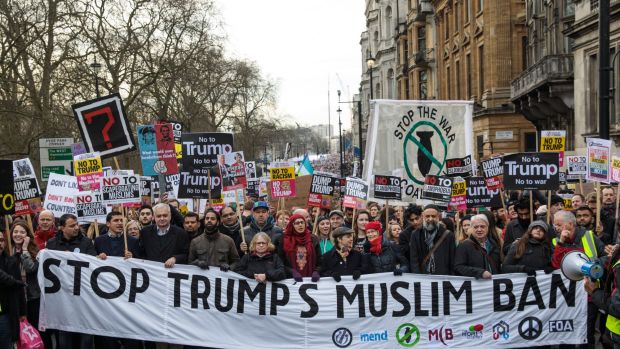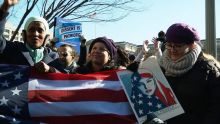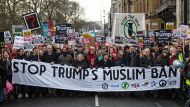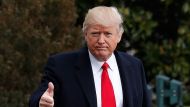Washington: President Donald Trump has attacked a federal judge who temporarily blocked his immigration order, calling him a "so-called judge" whose "ridiculous" ruling would be overturned.
In an early-morning Twitter message from his waterfront Florida resort, where he is spending the weekend, Trump wrote, "The opinion of this so-called judge, which essentially takes law-enforcement away from our country, is ridiculous and will be overturned!"
More World News Videos
Trump blasts ruling halting immigration ban
President Trump not too pleased by a federal judge's ruling temporarily blocking his immigration ban.
On Friday night, the White House said it would direct the Justice Department to file for an emergency stay of the ruling that would allow continued enforcement of the president's order. In his initial statement, press secretary Sean Spicer described the ruling, issued by Judge James Robart of US District Court in Seattle, as "outrageous."
Minutes later, the White House issued a new statement deleting the word outrageous.
The State Department says previously banned travellers will be allowed to enter the United States after the federal judge in Washington state temporarily blocked enforcement of President Trump's controversial immigration ban.
"We have reversed the provisional revocation of visas under Trump's executive order," a State Department spokesperson said Saturday. "Those individuals with visas that were not physically cancelled may now travel if the visa is otherwise valid."
Department of Homeland Security personnel "will resume inspection of travellers in accordance with standard policy and procedure."
The new measures continue what has been a chaotic rollout of Trump's order just more than a week ago that installed a temporary ban on entry by citizens of seven majority-Muslim countries as well as refugees.

US District Judge James L. Robart on Friday entered a temporary but nationwide stop to the order, saying he concluded the court "must intervene to fulfill its constitutional role in our tripart government."
Following the ruling, government authorities immediately began communicating with airlines and taking steps that would allow travel by those previously barred from doing so, according to a US official.

At the same time, though, the White House said in a statement that the Justice Department would "at the earliest possible time" file for an emergency stay of the "outrageous" ruling from the judge. Minutes later, it issued a similar statement omitting the word "outrageous."
"The president's order is intended to protect the homeland and he has the constitutional authority and responsibility to protect the American people," the White House said.
The president, however, was less cordial on Twitter.
When a country is no longer able to say who can, and who cannot , come in & out, especially for reasons of safety &.security - big trouble!
— Donald J. Trump (@realDonaldTrump) February 4, 2017
Interesting that certain Middle-Eastern countries agree with the ban. They know if certain people are allowed in it's death & destruction!
— Donald J. Trump (@realDonaldTrump) February 4, 2017
The opinion of this so-called judge, which essentially takes law-enforcement away from our country, is ridiculous and will be overturned!
— Donald J. Trump (@realDonaldTrump) February 4, 2017
The Trump administration said it would go to court as quickly as possible to dissolve Robart's order.
Robart has been on the bench since 2004, and was nominated by President George W. Bush.
"This ruling is another stinging rejection of President Trump's unconstitutional Muslim ban," said Omar Jadwat, director of the ACLU's Immigrants' Rights Project. "We will keep fighting to permanently dismantle this un-American executive order."
Robart granted a request from lawyers for the state of Washington who had asked him to stop the government from acting on critical sections of Trump's order. Justice and State department officials had revealed earlier Friday that about 60,000 - and possibly as many as 100,000 - visas already have been provisionally revoked as a result of Trump's order. A US official said that because of the court case, officials would examine the revoking of those visas so that people would be allowed to travel.
Washington Attorney General Bob Ferguson hailed the case as "the first of its kind" and declared that it "shuts down the executive order immediately."
Robart said in his written order that US officials should stop enforcing the key aspects of the ban: the halting of entry by refugees and citizens from certain countries. He did not specifically address the matter of those whose visas already had been revoked.
The judge's order does not mean the US has no say on who can enter it, only that the new restrictions in Trump's executive order cannot be implemented.
Since it was first rolled out a week ago, Trump's travel ban has been evolving - both because of legal challenges and as a result of decisions by the administration to walk back aspects of it. Green-card holders from the affected countries, for example, no longer need waivers to get into the United States, as they did when the order took effect. And the Department of Homeland Security asserted Friday that the order does not apply to dual citizens with passports from countries other than the seven listed.
The numbers of visas revoked, too, demonstrated the far-reaching impact of the order. Families have been split, students unable to pursue their education, and those in the United States unable to leave for fear of not being able to return - and not by the handful, but by the tens of thousands.
During a hearing in a lawsuit by two Yemeni brothers who arrived at Dulles International Airport last Saturday and were quickly put on a return flight to Ethiopia because of the new restrictions, a Justice Department lawyer said 100,000 visas had been revoked.
The figure, though, was immediately disputed by the State Department, which said the number of visas revoked was roughly 60,000. A spokeswoman said earlier Friday the revocations have no impact on the legal status of people already in the United States, but if those people left the country, their visas would no longer be valid.
Washington and Minnesota had filed a broad legal challenge to Trump's order, alleging it was "separating families, harming thousands of the States' residents, damaging the States' economies, hurting State-based companies, and undermining both States' sovereign interest in remaining a welcoming place for immigrants and refugees." Jeffrey P. Bezos, the owner of The Washington Post and a Washington state resident, has spoken out against the ban.
In the past several days, federal judges in New York, California, Massachusetts and Virginia have issued rulings temporarily blocking aspects of the Trump order - though the orders all seemed to be limited to people who had made their way to US airports, or, in Virginia's case, to certain people.
The New York and Massachusetts rulings both blocked the government from detaining or deporting anyone from the seven affected countries who could legally enter the US, and the Massachusetts ruling added the critical phrase "absent the executive order." In California, a judge declared that US officials were also prevented from "blocking" people from entering who had a valid visa.
The Washington Post














